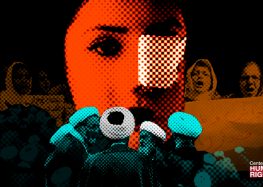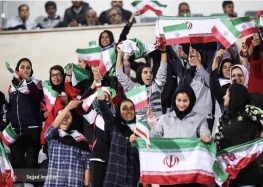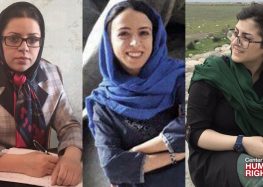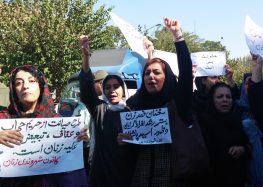Iranian Women Made History at Rio Olympics
First Olympic Medal Won despite Little Official Support in Iran
The Islamic Republic of Iran participated in the 2016 Summer Olympic Games in Rio de Janeiro with 63 athletes, only nine of whom were women. Yet Kimia Alizadeh, competing in taekwondo, made history when she became the first Iranian woman to win an Olympic medal.
It was a momentous event for Iranian female athletes, who are often shamed by religious and political figures for participating in sports and suffer a serious disadvantage compared to many of their competitors due to the Iranian government’s refusal to support them.
After Iran’s 1979 revolution, Iranian women were banned from taking part in international sports competitions for more than a decade. Finally, Iranian women shooters became the first female athletes to represent post-revolutionary Iran in an international competition in the 1990 Asian Games. Then, in 1996, shooter Lida Fariman became the first Iranian woman to participate in the Olympics from the Islamic Republic.
In the 2016 Rio Olympics, Iranian women competed in taekwondo, rowing, track and field (shot put), table tennis, shooting and archery. In regional qualifying Olympic competition rounds, women also competed in other categories including tennis and wushu martial arts. In every instance, women wore the state-enforced Islamic hijab.
The state-run Islamic Republic of Iran Broadcasting (IRIB) station and other official media outlets dedicate minimal time and space to reporting on women’s sports. Iranian users have been filling the vacuum left by state media’s refusal to cover women’s sports by using social media to share images and stories of female athletes on sites like Facebook and Twitter (illegal in Iran), and Instagram and Telegram.
This has led to increasing criticism of women’s participation in sports from conservative and hardline religious quarters, even though Iran’s supreme leader, Ali Khamenei, has described Iranian women’s participation in international sports as “important and valuable with the observance of the Islamic hijab and chastity.”
Several senior theologians in Qom, Friday prayer leaders, and politicians have stressed that women’s first responsibility is to their family, and have chided female participation in international competitions, at times describing their participation as scandalous.
“There’s no virtue in our girls and women getting medals for us by throwing their legs in the air and striking another athlete. What direction are we headed in?” said Ayatollah Abdollah Javadi Amoli, a senior Qom-based theologian in a lecture on October 8, 2014.
Many Shia religious authorities only approve of women’s sports if they’re hidden from the public eye or occur exclusively in front of a female audience. Yet internationally Muslim women from various countries, including the United States, have increasingly competed on the world stage by wearing custom-made suits that allow them to wear the hijab while they complete.
In swimming events female athletes now have the option of wearing a “burkini,” a swimsuit that covers the entire body except the face, hands and feet. The burkini is banned in Iran, however, and women are still completely prohibited from participating in international swimming events.
Iranian Female Athletes in Rio and Beyond
Kimia Alizadeh, an 18-year-old Iranian female taekwondo fighter, was ranked 26th in the world, but was able to clinch a bronze medal in Rio—the first Olympic medal won by an Iranian woman—by defeating Swedish athlete Nikita Glasnović in the 57 kg weight class with a dominating score of 5-0. Alizadeh previously won a gold medal in the 63 kg class at the Nanjing 2014 Youth Olympic Games and a bronze medal at the 2015 World Taekwondo Championship in Russia. President Hassan Rouhani congratulated Alizadeh on her historic victory and thanked her for “making all people happy, especially women.”
Raheleh Asemani was a member of the Iranian women’s national taekwondo team until 2012, when she was given political asylum in Belgium. In 2010 she became the first Iranian woman to advance to the final round of the Asian Games in taekwondo and won a silver medal in the 62 kg class. Representing Belgium in Rio 2016, Asemani was defeated in the preliminary rounds by Egyptian fighter Hedaya Wahba.
Leyla Rajabi was born as Tatsiana Ilyushchanka in Belarus, but changed her name in 2007 after marrying an Iranian and converting to Islam. The shot putter won a silver medal in the 2005 European Cup First League and another silver medal at the 2014 Asian Games. Rajabi failed to win a medal in Rio 2016 and exited the competition in 16th place. “Wearing the hijab is not a problem,” she said in an interview with the Mardomsalari newspaper on July 10, 2016. “The problem in Iran is the lack of facilities for women.”
Mahsa Javer, born in 1994, missed a medal by just two seconds when she came in fourth in the women’s rowing single sculls event. In the repechage heats (trials heats in which first heat losers are given another chance to qualify), Javer won third place—not good enough to advance to the next round. In the 2014 Asian Games in South Korea, Javer won a bronze medal along with three teammates in the women’s coxless four rowing event.
Neda Shahsavari, a table tennis competitor born in the western city of Kermanshah, was eliminated in her first match in the Rio games by a score of 3-4 by Alexandra Privalova of Belarus. In London 2012, Shahsavari became the first woman to represent Iran in the Olympics in table tennis.
Zahra Nemati, a paraplegic archer, competed in two preliminary rounds but did not earn enough points for the next round. Nemati became the first Iranian woman to win a gold medal at the London 2012 Paralympic Games. After her outstanding performance in London, she received the 2013 Spirit of Sport Individual Award for “her achievements, her determination, courage and self-motivation,” which made her “a role model in Iranian society, helping to change perceptions of people with an impairment,” according to the Paralympics’ press release. Nemati was a black belt competitor in taekwondo before she suffered a spinal cord injury in 2004. She took up archery two years later.
Golnoush Sebghatollahi participated in her first Olympic Games as a shooter in Rio. She finished 21st in the 10m air rifle category and 28th in the 25m.
Mahlagha Jambozorg was eliminated in the qualification rounds of the 50m rifle 3 positions category. She dedicated the silver medal she won in the 2010 Asian Games in China to Khamenei, who praised the “superior hijab” that she wore in the form of a chador, a form-concealing piece of cloth that only exposes the face. She reached the final round in the 2010 World Shooting Championships in Munich and finished in fourth place in the 10m air rifle event.
Najmeh Khedmadi, also a member of the Iranian shooting team, finished 8th in the final round of the 50m rifle 3 positions in Rio. Khedmati had won the gold medal at the 2014 Asian Games in Korea in the 10m Air Rifle category.
Elaheh Ahmadi earned 6th place in the 10m air rifle shooting event. In the same category, Ahmadi reached the finals at the 2012 Olympics and won gold at the 2015 Shooting World Cup in Germany.
Stadium Ban
Iranian women have demonstrated their ability to successfully participate in sports competitions despite resistance from religious and political quarters, but they are still banned from attending men’s sport events in Iran.
Iranian and international rights activists have protested the ban as discriminatory—an act that has landed some women in jail. The ban was highlighted at the Rio Olympics when activist Darya Safai held a sign at the men’s volleyball game between Iran and Egypt and called on the Iranian authorities to “let Iranian women enter their stadiums.” She was initially told to put away the sign as Olympic officials usually do not allow political statements at the games, but she was later given permission to continue her protest.
Until 2012, the ban on female fans at male sports events in stadiums only applied to soccer matches. But since that year women have also been prevented from watching men’s basketball and volleyball games inside arenas. The International Volleyball Federation and human rights groups have repeatedly called on the Islamic Republic of Iran to put an end to the ban on women in sports arenas.






